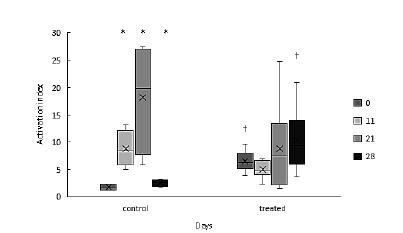ABSTRACT
Ozone (O3) therapy has been used for medical procedures for centuries; however, there are no extensive studies on its utilization in horses. This study aimed to evaluate the application of transrectal O3 on horses by physical and laboratorial evaluation, and production of reactive oxygen species (ROS). Sixteen healthy horses were separated in two groups: a control group (CG) and a group treated with O3 (TG). The TG animals received 1L of an oxygen and O3 mixture transrectally. The initial dose was 10µg/ml for the first two applications, 15μg/ml for the following two applications, and 20μg/ml for the next six applications. The CG animals received 1L of oxygen transrectally. In TG animals no variations in the physical examination were detected; furthermore, TG animals did not exhibit changes in biochemical evaluation results, fibrinogen concentrations, or ROS production. TG animals had increased red blood cell counts, hemoglobin concentrations, and packet cell volume values in comparison to the baseline and CG values. We could infer that O3 affected the red blood cell counts and improved rhetological properties of the blood. The transrectal application of O3 in horses is safe and can indirectly improve the oxygenation and metabolism of tissues.
Keywords:
antioxidant; red blood cell counts; horse; ozone therapy

 Effects of transrectal medicinal ozone in horses - clinical and laboratory aspects
Effects of transrectal medicinal ozone in horses - clinical and laboratory aspects



